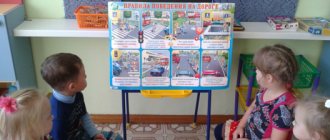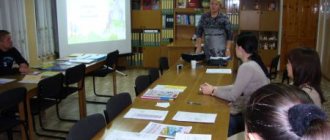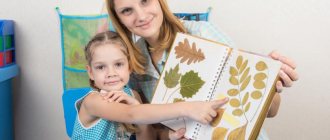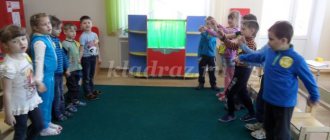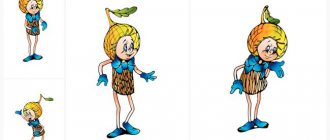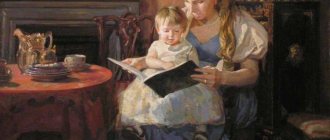Short-term project at a preschool educational institution for the senior group “We advise everyone to be friends”
Relevance: in older preschool age, mature children establish themselves, establish themselves in a team of children, form friendships and the ability to cooperate, and increase attention to peers as a partner for joint activities and communication.
Problem: during long-term observations of the behavior and independent activities of children, life in a group during the educational process, and routine moments, we noted that many children do not know how to communicate with peers, negotiate, solve problem situations peacefully, or defend their point of view without quarrels, insults and fights. Children put their own priorities above, without regard for the opinions and needs of other children.
Project scale: short-term (2 months).
Goal: introducing children to established norms of social behavior and rules of relationships with peers, creating ideas about friendship.
Tasks:
1. Generalize, expand and deepen children’s knowledge about friendship and friends.
2. Encourage children to engage in collective activities, promote the emergence and accumulation of positive communication experiences and cultivate social and communication skills (responsiveness, kindness, empathy, compassion, empathy, friendliness, ability to negotiate with each other).
3. Systematize children’s information about the culture of behavior in society and relationships between people.
I. Preparatory stage:
1. Reading “Festival of Friendship” by I. Vachkov, discussion, conversation and questions about the content.
II. Implementation stage:
1. Conversation about friendship and friends “Who is a friend?”, “What is friendship?”
2. Reading: Victor Dragunsky “Childhood Friend.” Discussion and conversation on content.
3. Proverbs and sayings about friendship and friends.
4. Reading the fairy tale “The Bubble, the Straw and the Bast Shot.”
5. Reading “Three Comrades” by V. Oseeva.
6. Reading poems about friendship: Y. Entin “About Friendship”, A. Kuznetsova “Girlfriends”, T. Agibalova “I Now Have a Friend”, V. Berezhnaya “Friendship is a Warm Wind...”, L. Kvitko “Two friend”, V. Viktorov “Children of the whole Earth are friends.”
7. Compiling the story “My Best Friend.”
8. Conversation - reasoning “Why do we need friends?”
9. Dramatization of the fairy tale “The Cat, the Rooster and the Fox.”
10. Games and exercises “Recognize by voice”, “With your backs to each other”, “Give advice”, “Compliment”.
11. Watching the cartoon “The Biggest Friend”, discussions and conversation on the content.
12. Productive activity: drawing “Portrait of a Friend”, applique “Gift for a Friend”, designing a “Toy for a Friend” from paper.
13. Listening and memorizing songs about friendship “A True Faithful Friend”, memorizing the poem “We advise everyone to be friends.”
14. Resolution of the problem situation “Who offended whom?”
The final stage:
1. Drawing up rules of friendship.
2. Leisure “We advise everyone to be friends.”
Final event: quiz “About friendship and friends.”
Expected result: children classify information about friendship and friends, norms of behavior and rules of relationships with peers, the atmosphere in the group will improve.
Nomination: Kindergarten, Methodological developments, Project activities, Senior group Author: Belyaevskikh Elena Vyacheslavovna Position: teacher Place of work: MADO "Child Development Center - Kindergarten No. 410" Location: Perm, st. Captain's 21
Date modified: February 17, 2022 Date published: February 17, 2018
Journey to the land of interesting games: a project for children of senior preschool age
Rizyapova I.I., Khabibullina V.N. Journey to the land of interesting games: a project for children of senior preschool age // Owl. 2022. N 4 (18). URL: https://kssovushka.ru/zhurnal/18/ (access date: 01/19/2022).
Order No. 431957
APPENDIX: Approximate game plan for the implementation of the project “Journey to the Land of Interesting Games”
Type of project : speech, cognitive and creative.
Implementation time: long-term.
Project participants: children 5-6 years old, 6-7 years old, teachers, parents of students.
Relevance of the topic:
Currently, the requirements of the educational system for the speech development of children have increased. The Federal State Educational Standard has defined as one of its objectives the development of the abilities and creative potential of each child as a subject of relationships with himself, other children, adults and the world. The comprehensive development of a preschooler can be achieved only on the basis of play activities, during which the child develops imagination and the symbolic function of consciousness, gains experience in communicating with peers, and comprehends moral values and rules of behavior in society.
In this regard, the issue of developing verbal creativity in preschool children using various methods and technologies is relevant.
Based on the above, goals and objectives were set for the development of verbal creativity of older preschoolers in the process of developing gaming technologies that stimulate verbal creativity and independence of children.
Goal: Development of speech creativity of preschool children in the process of play activities through inclusion in various types of activities, teach them to speak the Tatar language, develop dialogic and monologue speech.
Tasks.
Educational:
- to cultivate independence, initiative through the organization of play activities, positive relationships between children and adults.
- cultivate a desire to communicate in the Tatar language.
Educational:
- develop variable thinking, imagination and creative abilities, curiosity, observation, the ability to experiment, create conditions for the formation of fantasy, imagination, and creativity.
- improve all aspects of speech: achieve clear pronunciation of all sounds of the native language, expand and activate the vocabulary, continue to develop dialogical speech,
- develop interest in learning the Tatar language, promote speech understanding and the desire to speak and communicate in another language.
Educational:
- teach word creation;
- teach forms of monologue speech in the Tatar language;
- teach answering questions in a short and common form.
Project implementation principles:
- Accessibility: taking into account the age characteristics of children; adaptability of the material.
- Systematicity and consistency: gradual presentation of material from simple to complex; frequent repetition of acquired knowledge, rules and norms.
- Visual and entertaining: the proposed material must be understandable, have an entertaining beginning, be playful or have elements of a game or surprise.
- Dynamism: integration of the project into different activities.
- Supporting children's initiative in various activities.
- Taking into account the individual characteristics of each child.
- Introducing children to sociocultural norms, traditions of the family, society and state.
Stages of work on the project
Stage I – information and analytical support for the project.
- Collection and analysis of information.
- Selection and study of literature on project activities.
- Study of advanced pedagogical experience in developing children's ideas about play.
- Selection of methods for pedagogical diagnostics of pupils and parents (observation of children, individual conversations).
- Analysis of the results of pedagogical diagnostics.
Stage II - main
Scheme for implementing work experience in areas of development
| Directions of development | Types of games in joint activities of adults and children and independent activities of children |
| Social - communicative | Didactic, role-playing, nature history games. Board games, word games, bonding games, social interaction |
| Speech | Didactic games, speech games |
| Cognitive | Didactic games, word games, educational games, board and printed games, games with mathematical content |
| Artistic and aesthetic | Games - dramatization, games - dramatization, folk games, games - round dances, logorhythmics |
| Physical | Outdoor games with words, games with speech accompaniment, physical exercises, logarithmics, motor games. |
Stage III – final
Generalization of work experience.
Collaboration with parents
- Visual information: consultations “Speech development: games with the family”, “Games for the development of creative imagination”. Recommendations for parents “Game is serious”, “The world in a child’s creativity.” Publication of the pedagogical and parent newspaper “Krepysh”.
- Children and parents projects: “Creative workshop”, “Interesting games”, “Dreamers”, “Rhyme”.
- Step-by-step drawing: “You start, and I will continue.”
- Exhibitions of drawings: “Fairytale World”, “Abracadabra”, “Nonexistent Country”.
- Questionnaire: “Does your child like to fantasize?”
- Baby dictionary “Our children come up with it.”
- “Parents’ Diary or “Nechukovsky” from 2 to 5.”
- Competition of inventions: “Funny story”, “Changes”.
- Training “Sharing family experience.”
- Mailbox "Question and answer".
- A collection of ideas: “An unusual toy.”
- Family gatherings.
Expected result of project activities:
- To introduce children to the process of cognition through involving them in various types of practical and play activities.
- Develop cycles of game-activities for sections of the project, each of which would combine elements of different types of activities.
- Create a positive microsociety where each participant (adult and child) develops in the process of joint activity and co-creation.
- Increase the authority of the teacher and other preschool employees.
- Increase the pedagogical competence and activity of parents.
- Invite kindergarten teachers to participate in the implementation of the project to create comfortable conditions for the child.
- Teach children to speak the Tatar language, develop dialogic and monologue speech.
- Encourage parents to want to independently organize joint, creative games with their children at home.
Approximate game plan for the implementation of the project “Journey to the Land of Interesting Games” (Appendix).
Literature:
- Dyachenko O.M., Agayeva E.L. What doesn't happen in the world? 2001.
- Zaripova Z.M. Tatarcha sөylәshәbez // Methodology kullanma. Kazan, 2012.
- Karpova S.I., V.V. Mamaeva. Development of speech and cognitive abilities of preschoolers 4-5 years old // Creative Center. St. Petersburg, 2010.
- Kukushkina E.Yu., Samsonova L.V. Playing and learning to be friends // Teacher's Library. M.: Creative Center, 2013.
- Miklyaeva N.V. Interactive pedagogy in kindergarten // Library of the journal “Preschool Education Management”. M.: Creative Center, 2012.
- Miklyaeva N.V., Reshetilo E.A., Lopatina O.G. Play environment at home // Teacher's Library. M.: Creative Center, 2011.
- Miklyaeva N.V., Yu.N.Rodionova. Developing the abilities of preschoolers // Teacher's Library. M.: Creative Center, 2010.
- Penkova L.A., Konnova Z.P., Malysheva I.V., Perkova S.V. Development of play activity of preschoolers // Management. M.: Creative Center, 2010.
- Skorolupova O.A., Loginova L.V. Let's play?.. Let's play!!! From work experience. M., 2006.
- Shchetinina A.M. Teaching preschoolers to think // Teacher’s Library. M.: Creative Center, 2011.
